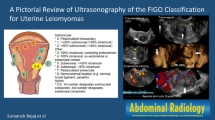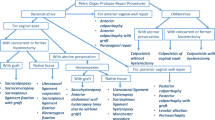Abstract
Introduction
The purpose of this study was to evaluate the feasibility, clinical outcome and complications of laparoscopic surgery in women with endometrial cancer and to compare surgical outcome and postoperative early and late complications with results of traditional laparotomy.
Methods
Forty women with endometrial cancer underwent laparoscopic hysterectomy, bilateral salpingo-oophorectomy and pelvic lymphadenectomy. Each patient operated by laparoscopy was matched by age, preoperative clinical stage and histology of the endometrial cancer with a patient treated by the same operation but using traditional laparotomy. Half of these patients underwent total pelvic lymphadenectomy and half had pelvic lymph node sampling. The groups were compared in clinical characteristics, surgical outcomes, recoveries and early and late postoperative complications.
Results
The patients in the laparoscopy group had less blood loss, more lymph nodes removed, shorter hospital stay but longer operation time than those treated by laparotomy. Only one (2.5%) laparoscopy was converted to laparotomy due to pelvic adhesions. There were no intraoperative complications in either group. Postoperative complications were more common (55.0%) in the laparotomy than in the laparoscopy group (37.5%). Only one major complication (2.5%) occurred among patients undergoing laparoscopy as compared with three (7.5%) major complications in the laparotomy group. Superficial wound infection was the most common (20%) infection in laparotomy patients while vaginal cuff cellulitis occurred in 10% of laparoscopy patients. Late (>42 days) postoperative complications were almost equally frequent (20.0 and 22.5%) in both groups. Lower extremity lymph edema or pelvic lymph cyst was found in 12.5% of all cases. As a result of surgical staging the disease of 6 women (15%) in both groups was upgraded.
Conclusions
Laparoscopic surgery is a viable alternative to traditional surgery in the management of endometrial cancer. The surgical outcome is similar in both cases. In laparoscopic procedures the operation time is longer but the postoperative recovery time shorter than in laparotomy. Severe complications were limited in both groups, while wound infections can be avoided using laparoscopy.
Similar content being viewed by others
References
Burger MPM (2001) Management of stage 1 endometrial carcinoma. Postoperative radiotherapy is not justified in women with medium risk disease. BMJ 322:568–569
Childers JM, Brzecheffa PR, Hatch KD, Surwit EA (1993) Laparoscopically-assisted surgical staging (LASS) of endometrial cancer. Gynecol Oncol 51:33–38
Eltabbakh GH (2000) Effect of surgeon's experience on the surgical outcome of laparoscopic surgery for women with endometrial cancer. Gynecol Oncol 78:58–61
Eltabbakh GH, Shamonki MI, Moody JM, Garafano LL (2000) Hysterectomy for obese women with endometrial cancer: laparoscopy or laparotomy? Gynecol Oncol 78:329–335
Faught W, Krepart GV, Lotocki R, Heywood M (1994) Should selective para-aortic lymphadenectomy be part of surgical staging for endometrial cancer? Gynecol Oncol 55:51–55
Gemignani ML, Curtin JP, Zelmanovich J, Patel DA, Venkatraman E, Barakat RR (1999) Laparoscopic-assisted vaginal hysterectomy for endometrial cancer: clinical outcomes and hospital charges. Gynecol Oncol 73:5–11
Härkki-Sirén P, Sjöberg J, Mäkinen J, Heinonen PK, Kauko M, Tomás E, Laatikainen T (1997) Finnish national register of laparoscopic hysterectomies: a review and complications of 1165 operations. Am J Obstet Gynecol 176:118–122
Hopkins MP (2000) The myths of laparoscopic surgery. Am J Obstet Gynecol 183:1–5
Kadar N (1997) Port-site recurrences following laparoscopic operations for gynaecological malignancies. Br J Obstet Gynaecol 104:1308–1313
Kotwall CA, Kirkbride P, Zerafa AE, Murray D (1994) Endometrial cancer and abdominal wound recurrence. Gynecol Oncol 53:357–360
Lim BK, Lavie O, Bolger B, Lopes T, Monaghan JM (2000) The role of laparoscopic surgery in the management of endometrial cancer. Br J Obstet Gynaecol 107:24–27
Magrina JF, Mutone NF, Weaver AL, Magtibay PM, Fowler RS, Cornella JL (1999) Laparoscopic lymphadenectomy and vaginal or laparoscopic hysterectomy with bilateral salpingo-oophorectomy for endometrial cancer: morbidity and survival. Am J Obstet Gynecol 181:376–381
Malur S, Possover M, Michels W, Schneider A (2001) Laparoscopic-assisted vaginal versus abdominal surgery in patients with endometrial cancer—a prospective randomized trial. Gynecol Oncol 80:239–244
Muntz HG, Goff BA, Madsen BL, Yon JL (1999) Port-site recurrence after laparoscopic surgery for endometrial carcinoma. Obstet Gynecol 93:807–809
Possover M, Krause N, Plaul K, Kühne-Heid R, Schneider A (1998) Laparoscopic para-aortic and pelvic lymphadenectomy: experience with 150 patients and review of the literature. Gynecol Oncol 71:19–28
Querleu D, Lebanc E, Castelain B (1991) Laparoscopic pelvic lymphadenectomy in staging of early carcinoma of the cervix. Am J Obstet Gynecol 164:579–581
Reich H, DeCaprio J, McFlynn F (1998) Laparoscopic hysterectomy. J Gynecol Surg 5:213–216
Scribner DR Jr, Walker JL, Johnson GA, Scott D, McMeekin DS, Gold MA, Mannel RS (2001) Surgical management of early-stage endometrial cancer in the elderly: is laparoscopy feasible? Gynecol Oncol 83:563–568
Scribner DR Jr, Walker JL, Johnson GA, McMeekin DS, Gold MA, Mannel RS (2002) Laparoscopic pelvic and para-aortic lymph node dissection in obese. Gynecol Oncol 84:426–430
Spirtos NM, Schlaerth JB, Gross GM, Spirtos TW, Schlaerth AC, Ballon SC (1996) Cost and quality-of-life analyses of surgery for early endometrial cancer: laparotomy versus laparoscopy. Am J Obstet Gynecol 174:1795–1800
Wang P-H, Yen M-S, Yuan C-C, Chao K-C, Ng H-T, Lee W-L, Chao H-T (1997) Port site metastasis after laparoscopic-assisted vaginal hysterectomy for endometrial cancer: possible mechanisms and prevention. Gynecol Oncol 66:151–155
Acknowledgement
This work was supported by a grant from the Medical Research Fund of Tampere University Hospital.
Author information
Authors and Affiliations
Corresponding author
Rights and permissions
About this article
Cite this article
Kuoppala, T., Tomás, E. & Heinonen, P.K. Clinical outcome and complications of laparoscopic surgery compared with traditional surgery in women with endometrial cancer. Arch Gynecol Obstet 270, 25–30 (2004). https://doi.org/10.1007/s00404-003-0488-7
Received:
Accepted:
Published:
Issue Date:
DOI: https://doi.org/10.1007/s00404-003-0488-7




